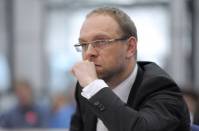Stubbornly careering off track

Serhiy Vlasenko gave a briefing on Monday after not being seen in public since the High Administrative Court on 6 March stripped him of his parliamentary mandate. It had seemed quite conceivable that his would be the next case where a member of Ukraine’s opposition has been given asylum in an EU country. However Vlasenko said on Monday that he does not plan to leave the country.
He did, however, announce that he had just sent an application to the European Court of Human Rights, dated 11 March. He asserts in the application that the Court’s revocation of his parliamentary mandate violates a number of articles of the European Convention on Human Rights.
While it is for the Court in Strasbourg to determine whether the application is admissible, it is worth noting that the High Administrative Court’s ruling is final and not subject to appeal. There are probably no other legal remedies remaining within Ukraine.
His deputy’s mandate, he said, had been “some safeguard for an independent position in the courts and mechanism for defending myself against unlawful encroachments from the Prosecutor’s Office. Now I’ll have to search for other mechanisms”.
As reported, on 5 March, the Prosecutor General’s Office announced the termination of the criminal case against Vlasenko initiated over his ex-wife’s complaint that he had failed to comply with a court ruling.
The announcement coincided with the first day of the High Administrative Court’s “deliberations”, though the term can only be used loosely. As reported, Parliamentary Speaker Rybak had gone for a one for one approach, asking for the mandates to be revoked of two MPs: one, Andriy Vereyevsky from the Party of the Regions; the other – Serhiy Vlasenko from Batkivshchyna, a long-standing MP and also defender of imprisoned former Prime Minister Yulia Tymoshenko.
Andriy Vereyevsky, a millionaire with strong business interests, was stripped of his mandate immediately.
While it was impossible to believe that the real target was not Serhiy Vlasenko, it is worth noting that the judgement is seriously questionable with respect to any MP (and the list of MPs who really are combining current business activities with their parliamentary role is large).
The court refused to consider the objections from Yaseny Yatsenyuk regarding serious procedural irregularity given that there had not been a meeting of the Parliamentary Regulations Committee.
More important, of course, is the issue of how the High Administrative Court can be acting in breach of the very principles of a democracy. It has now stripped four MPs of their mandate after they were accepted as having been elected by the Central Election Commission.
The court ignored a statement of concern from Catherine Ashton and Štefan Füle, EU Commissioner for Enlargement and European Neighbourhood Policy in which they stressed that Ukraine’s law on the parliamentary elections stipulates “a clear, five-day time framework for the results of the elections to be challenged before the Courts. Legal proceedings which come months after the confirmation of the final election results raise political and legal concerns”.
There have since been statements condemning the ruling from the President of the European Commission, the Parliamentary Assembly of the Council of Europe, the USA and others. Štefan Füle also tweeted a message in which he said that stripping Vlasenko of his mandate was not the European way and was hardly going to bring Ukraine closer to an Association Agreement.
Interfax Ukraine reports that the European Parliament will be discussing the situation in Ukraine at a plenary session on 13 March. Catherine Ashton, EU High Representative for Foreign Affairs and Security Policy, is expected to make a statement at the meeting.
The concern is well-founded.
Instead of taking measures, as seemingly promised at the EU-Ukraine Summit on 25 February, to free Tymoshenko and Lutsenko, another court has deprived Tymoshenko’s defender (not the same as her defence lawyer) of his parliamentary seat.
Of concern must also be the fact that in January the Prosecutor initiated at least three criminal cases against Vlasenko. While all were based on conflict with his ex-wife, it seems likely that only one of them has been terminated. One of the charges was over supposedly stealing a car which he asserts was his It should be stressed that the report from the Prosecutor General’s Office on 5 March stated that Vlasenko had been repeatedly summoned for questioning to the Prosecutor General’s Office’s Central Department of Investigation into Particularly Important Cases.
There is a nominal date of May for “resolution” of various issues, including selective justice. Unfortunately, however, last week’s court ruling and the rather inept measures to prove that the measures were not targeting an opposition MP and Yulia Tymoshenko's defender make chances for the EU-Ukraine Association Agreement seem close to non-existent.





